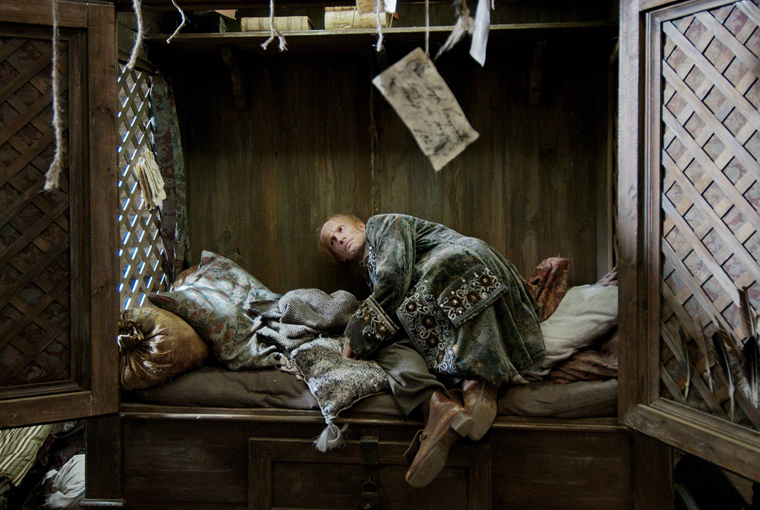
Like in Goethe’s play, Sokurov’s Faust begins in heaven. In the first animated sequence in Sokurov’s work, a paper slowly swivels down to earth, reaching a small village set at the foot of a mountain. Whatever might be written on this paper – “in the beginning was the word” is Faust’s major problem, and to turn this divine phrase into “in the beginning was the deed”, the project of the Faustian feat.
Sokurov’s Faust, although based on Goethe’s version, however, remains Sokurovian. He returns to the well-known anamorphic distortions he used in his previous films, and the dramatic structure of Goethe’s play appears fragmented and out of order. Most strikingly, the pact with the devil is only signed very late in the film, when Faust has met Gretchen, already having been to the Auerbach’s Keller and Gretchen’s brother already being dead. The pact in Sokurov’s film is not based on the famous “linger a while”, but, on the contrary, on Faust’s wish to spend a night with Gretchen – a rather short-lived experience.
The search of happiness out of intellectual doubt that something like happiness exists is not central to Sokurov’s film. Here, Faust (Johannes Zeiler) is a rather naïve everyman who is frustrated by his economical and sexual situation. Lack of money, not a spiritual vacuum, plays the essential role in Sokurov’s film – Mephistopheles is a money-lender, and Faust seems to be so poor that he can’t afford a meal that could enable him to keep thinking…
Sokurov’s film marks the end of a tetralogy on power – following his portrayals of 20th century rulers Hirohito, Lenin, and Hitler. As a sort of anachronistic synthesis, Faust shall bring them together, unifying their shared compulsions that Sokurov himself sums up with the words “unhappy people are dangerous”, several times repeated throughout the film. Above all, the economic aspect in Sokurov’s film connects the fictious character with its historical counterparts. The financial crisis of the entre-guerre being one of the major reasons for the success of totalitarianism, this is surely justified.
But unlike the dictators, Sokurov’s Faust doesn’t seem dangerous at all. He might be melancholic and someone more familiar with words than with deeds, but he doesn’t appreciate the actions of Mephistopheles (brilliantly acted by Anton Adasinsky). Indeed, the Faust in Sokurov’s film surprisingly repents the deeds of his friend from the underworld. One might even speculate that he only signed the “pact” to somehow repair his wrongdoings, and not because he wanted to take advantage of Gretchen. Faust really cares for that girl. He tells her the truth about his crime against her brother, and is more of an altruistic than a hedonistic devil. Whereas the devil in Goethe’s Faust opens up a world for a closed-up looser, Sokurov’s Faust doubts the good intentions of his companion as their journey moves on. Later in the film, Faust even kills the devil by lapidating him in desperate rage.
The harmless impression Faust gives can definitely be explained with Sokurov’s prior films about dictators. Sokurov’s Hitler is anything but a frightening evil criminal, and the same can be said about Sokurov’s depiction of Lenin and Hirohito. Like Sokurov’s Faust, they are frustrated neurotics, so banal that they would appear ridiculous next to a full-blown devil like Mephistopheles. Even Faust’s eloquence is only silly romantic gibberish compared to Mephistopheles’ witty rhetorics. Where the devil is indifferent towards everything and everybody, Faust stays attached to worldly deeds. This is, in my opinion, the essence of Sokurov’s Faust. Faust is not like the devil, although he would love to be. He might do evil deeds – for instance killing Gretchen’s brother – but he is not indifferent. Unlike the devil who gets pleasure out of the mere fact of doing harm, Faust always has a reason for the things he does: science, knowledge, lust, and poverty. Faust might thus be Sokurov’s most human depiction of our historical dictators, if he can at all be compared with them. For this dictator is even able to show compassion and enough courage to kill the devil. Those of us who thought that dictators were devils, are thus invited, like Faust, to think again.




Leave a Comment